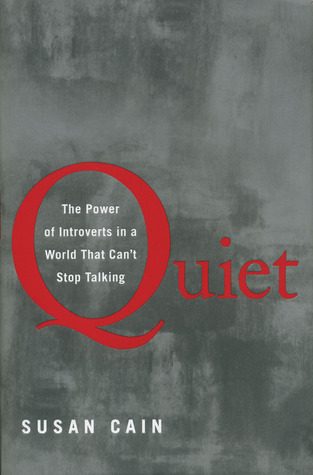 Susan Cain's 2012 book, Quiet: The Power of Introverts in a World That Can't Stop Talking, has won widespread acclaim and earned a place on many bestseller lists. Hardly surprising since her target demographic loves nothing more that to curl up with a good book. Over the course of 300 pages, Cain discusses the rise of the "extrovert ideal" in Western culture (more precisely American culture), and how this greatly undervalues the contribution of society's introverts.
Susan Cain's 2012 book, Quiet: The Power of Introverts in a World That Can't Stop Talking, has won widespread acclaim and earned a place on many bestseller lists. Hardly surprising since her target demographic loves nothing more that to curl up with a good book. Over the course of 300 pages, Cain discusses the rise of the "extrovert ideal" in Western culture (more precisely American culture), and how this greatly undervalues the contribution of society's introverts.Cain uses biological and psychological research to explain what makes someone an introvert. Surprisingly, it appears to be programmed into us from birth, with some babies being far more reactive to outside stimulation than others. These "high-reactives" go on to become introverts, people who get a little too affected by the world around them and therefore need to take a break from it once in a while. This is in contrast to their "low-reactive" counterparts who can't get enough stimulation and thrive in lively environments.
There's nothing wrong with being an introvert - it's just another way of being. Unfortunately, American culture has marginalized introversion and from a young age, children are made to feel as though they are doing something wrong if they don't talk more or socialize constantly. Classrooms are organized to encourage group activities and discussion, which may not even be the best way to instruct children, but has been deemed superior by the American educational system. In fact, a particularly humorous chapter discusses Asian students who moved to America and were instantly shocked at the way classrooms operated. One woman says that she was quiet and therefore regarded as less intelligent, while other students would just start talking, saying nothing of any real substance but still receiving high marks for "class participation." Introverts have great ideas and are often incredibly creative problem-solvers, but their reluctance to speak up means that they are often ignored in the group settings that dominate classrooms and businesses across America.
Study after study has shown that the "groupthink" and enforced teamwork that Western businesses encourage, are often completely counterproductive and result in fewer ideas of poorer quality. Yet, open-plan offices continue to be the norm and people are forced to work in teams when they may be far more productive on their own. Extroverted business leaders were probably responsible for the financial meltdown of 2008 because they were more prone to reckless actions when an introvert may have taken the time to stop and think. Harvard Business School is a bastion of extroversion, churning out extroverted business leaders year after year who may not fully appreciate and utilize the thoughts and actions of their introverted colleagues. Cain offers multiple examples of introverts who have succeeded in life by virtue of their temperament, and illustrates that introversion is something that Western society has demeaned for far too long.
Quiet is a wonderful book for introverts who feel underappreciated, but it is equally relevant to extroverts who want to understand the introverts in their lives. Cain offers advice for teachers, employers, and parents, and explains what it takes to cultivate and harness the powers of introversion. Extroverts need introverts and vice versa, and we need to find a way to bring the yin and yang together to create a more harmonious society.
No comments:
Post a Comment